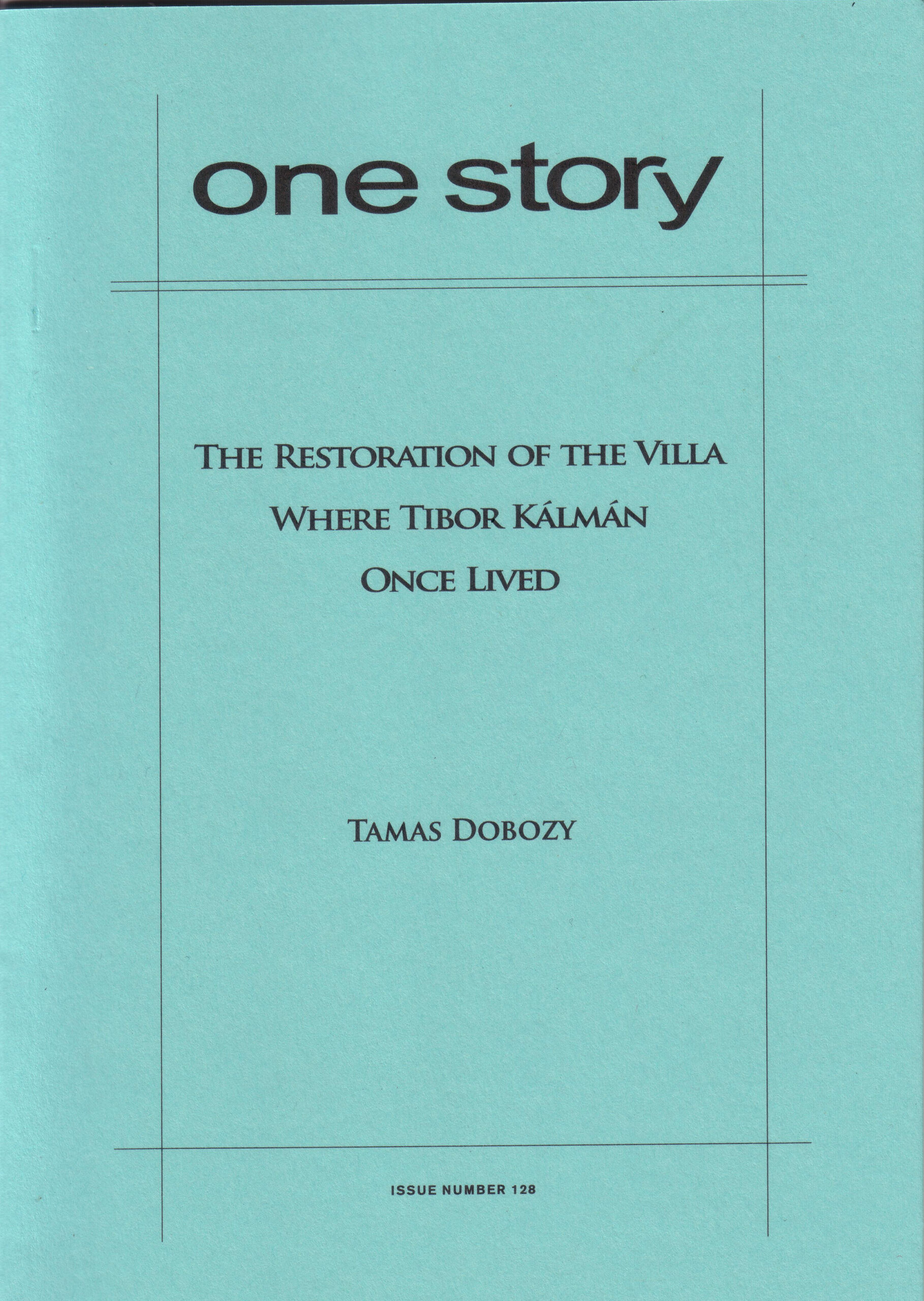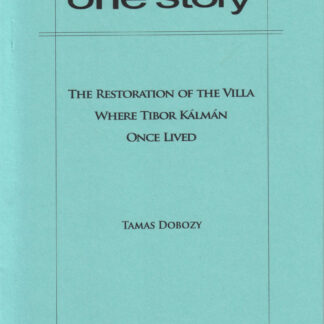
The Restoration of the Villa Where Tibor Kálmán Once Lived
$2.50
50 in stock
Excerpt
“Tíbor Kálmán. Tíbor Kálmán’s villa.” That’s what Györgyi told László the night they went AWOL from the camp, the two of them huddled in the barracks amidst the other conscripts, boys like them, but asleep, some as young as sixteen, called on in the last hours of the war in a futile effort to salvage a regime already fallen, a country and people already defeated. “We need to get to Mátyásföld,” Györgyi said, “that’s where the villa is. Tíbor Kálmán will give us papers.” But Györgyi didn’t make it far, only to the end of the barracks, to the loose board and through the fence, frantically trying to keep up to László, who always seemed to run faster, to climb better, to see in the dark. László was already waiting on the other side of the ditch, hidden in the thicket, when the guard shouted, when they heard the first crack of bullets being fired, Györgyi screaming where he’d fallen, “My leg! I’ve been shot! Láci help me,” and László looked back at his friend for a second, calculating the odds of getting to him in time, the two of them managing to elude the guards, limping along at whatever speed Györgyi’s leg would allow. They’d be caught, charged with desertion, executed—both of them. And then László turned in the direction he was headed, Györgyi’s cries fading in the distance.
Tamas Dobozy
Tamas Dobozy is an Associate Professor in the Department of English and Film Studies at Wilfrid Laurier University. He has published two books of stories, When X Equals Marylou (Arsenal Pulp) and Last Notes (Arcade Publishing). He has also published stories in Fiction, Alaska Quarterly Review, and Granta, among others. He lives with his family in Kitchener, Ontario, Canada.
Q&A by Pei-Ling Lue
- PL: Where did the idea for this story come from?
- TD: I was trying to write a novel for my publisher, who doesn’t want to publish any more of my books of stories, and I thought it would be interesting to write a sequence of stories that could be marketed as a novel without me having to actually become a novelist. I tried three variations on this, all involving the siege of Budapest, and this story is from the second of those three failed attempts. This would have been chapter four of that particular manuscript (the first chapter appeared recently in Fiction), but I never got any further than that. In the end the final product (the third version) was rejected by my publisher and a number of agents, for all the right reasons I think, and I dumped it and moved on, back to writing stories, which is all I really want to do anyhow. The siege has produced a ton of stories for me. It’s an almost inexhaustible source of inspiration, since it has it all: drama, humor (albeit dark), politics, history.
- PL: What was the most challenging aspect of writing this story?
- TD: Probably doing the edits. I’m not someone who’s particularly interested in reworking a piece. Most of the time I just wish the editors would do it for me, take over, do what they want to the material (provided it’s not cheesy or misleading or clunky or anything), and publish it. As time goes by, my interest in writing is really confined to the initial discovery of the work, and after that I’m not really interested in it anymore. I used to be one of those writers who worried over every comma and article during the editing process, in that OCD way typical of beginning writers, thinking that it would somehow invalidate my sole authorship of the story, but I don’t really care about that anymore. Now I just think, “Oh, do I really need to do all this work? If you want the story a different way, why don’t you just do it?” I really love the process of writing, and of course I like to see work published in a narcissistic way, if only to prove that the hours I spend typing do extend to someone other than myself, but more and more the only part of it that holds any meaning for me is the process of filling up the blank pages. Most editors I’ve run into are good enough at sorting out a story, though I’ve only once worked with an editor who I thought was a real genius at it.
- PL: Since this is a historical piece, what part did research play in your writing process?
- TD: Quite a lot. I did a lot of oral (or is that aural?) research, talking to relatives. I also discovered this incredible book by Krisztian Ungvary called The Siege of Budapest. A really remarkable work for a writer, once you get past the first logistical chapter. I found a lot of ideas there.
- PL: What challenges did you face writing about this time period?
- TD: Just to make it interesting, really. I’m not someone who feels an ethical need to be absolutely true to history. If I can invent a better way of dealing with the events than the way they actually happened, then I’ll do that. And “better” here means aesthetically, so the story can be more satisfying on that level. I guess I’ve always felt that literature is more entertainment than information, or that the kind of information it presents is not redeemable along some index of real-world verification. At the same time, I do feel this vestigial responsibility to be true to the tenor (for lack of a better word) of the times, which mainly means a sensitivity to what the people there went through, how it affected them, the sorts of lives that were made possible and impossible by the events endured, and not to levy judgment on them from some naive early 21st century North American standpoint. Sometimes you can get to what resonates in those events much more directly by tweaking things. Despite what I’ve said above, I don’t think I’ve ever done anything more egregious than tweaking history.
- PL: Some of the violent images of war are quite harrowing—was what appeared on the page inspired by actual events that happened in Budapest?
- TD: Yes. Most of that stuff is true—people betraying friends, buildings collapsing on refugees, hospital walls stacked with the maimed and dying. You don’t need to invent horrors for war; it produces them all by itself.
- PL: The restoration of this villa is the nexus of the whole story. How did you get the idea for using this as a device?
- TD: Well, when I was a kid I used to go to Hungary to Mátyásföld, where there is a villa where some relatives of mine now live, and where my mother grew up as a kid. It really is a lovely house, in a beautiful part of that suburb (which is quite beautiful altogether), though as my mother tells it that house was much bigger at one time, as well as the property, much of which was lost during the communist era with their reapportioning of real estate. So that particular villa has always been a symbol, a personal one, of this truncated or violated greatness, and I guess it was just waiting all these years to be transmogrified into the psychology of László, whose personal devolution in some way mirrors what happened to the country.
- PL: What do you think happens to László when he leaves the villa? Will he continue to try to search for redemption or will he accept that he’s a survivor no matter what consequence?
- TD: I know exactly what happens to him, because I started writing another chapter. He uses his fake name to lay low for a while, blackmailing the guy he goes to in Szekesfehervar, who’s another of the many compromised personages that populated that failed draft of a novel, and then in 1956 he escapes to the west.
- PL: One thing that came up a lot during our editorial discussions is whether or not László gets his comeuppance. What is your opinion about that? Is Agi’s safety compromised now that he has left?
- TD: Yes. Agi is arrested and dies. László gets away, and lives a pretty good life in Canada. He rarely thinks about her, though the villa comes up continually in his dreams and nightmares and even his waking desires.
- PL: How long did it take you to complete this story?
- TD: It was fast. In those days I had this working principle that I had to write one single-spaced page a day as fast as possible. This was my constraint because I’m a full-time prof. and father and don’t have much time for fiction. So I think it took me only a couple weeks to finish it. I’ve since dropped that strategy, since any strategy is only useful for so long, and then you need to change it up.
- PL: What are you working on now?
- TD: Just stories, really. I’d like to do something with the material on the siege, but not in the form of a continuous or extended narrative, a novel, or cycle or sequence of stories. I think a bunch of discrete and separate pieces on the siege would be interesting. But I’m really kind of enjoying my break from agents and publishers and the industry in general. If I’m going to publish, this is really where I’m happiest doing it for now, in places like One Story, where it’s about the editors and their love of the work, rather than who you know, and who you’re pleasing, and how far you’ll go to satisfy someone else’s vision of what constitutes valid publishing, and how successfully you can bend to the paternalism that seems the dominant tone in all areas of the publishing business. I just finished a story tangentially related to the siege, though it takes place in Canada in the 1970s. I’ll probably send it out somewhere soon.
- PL: What is the best bit of advice about writing you have ever received?
- TD: “Thank you for sending us your work. Unfortunately, it does not meet our needs at the present, but we hope that you will have luck with it elsewhere. Due to the overwhelming number of submissions we receive, we are unable to respond in a more personal manner. Thank you again for thinking of us.” Those words have done more to help me with improving my work than anything else.
